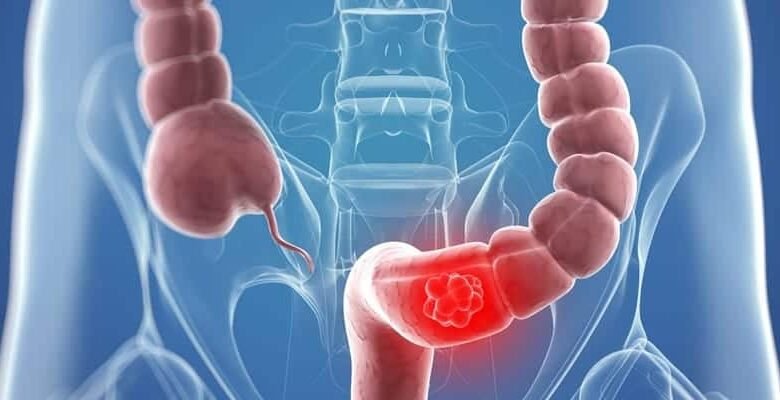Colon cancer

What is colon cancer?
The human colon is an S-shaped muscular tube about 4 meters long. It “extends” from the end of the small intestine and ends in the anus. The functions of the colon are three:
- Digestion and absorption of nutrients from food.
- Formation of fecal material by absorbing electrolytes and water from it.< /li>
- Storage and release of fecal material.
The right part of the large intestine has an important role in the absorption of water and minerals from food, while the left part stores and releases faeces from the body.
Cancer is a transformation of normal cells. And transformed or mutated cells grow and divide abnormally fast.
If left untreated, this type of malignancy grows and eventually passes through the colon wall and spreads to neighboring lymph nodes and organs.
And metastasis begins, and transformed cells enter the bloodstream and affect distant organs such as the liver, brain, lungs and bones.
What are the symptoms of colon cancer?
- If you notice blood in your stool or any type of rectal bleeding, you should seek medical attention because most people think that these are hemorrhoids and ignore the problem, but even so, at least you will avoid detecting colon cancer at a more advanced stage. of anemia caused by carcinoma.
- If the colon tumor has become large enough, it is also possible to cause intestinal obstruction. You may notice some of the symptoms of intestinal obstruction such as:
- Abdominal bloating – your belly has pulled forward without gaining weight.
- Abdominal pain – rarely occurs with colon cancer. One of the possible causes is intestinal perforation and leakage of contents into the abdominal cavity.
- Unexplained and persistent nausea and vomiting-
- Change in frequency and character of defecation.
- Thin stools.
- Feeling of incomplete bowel emptying after defecation.< /strong>
- Rectal pain
What are the causes?
Most cases of colorectal carcinoma are associated with adenomatous polyps, which are abnormal growths of cells on the lining of the colon.
These polyps can turn into cancer cells over time. It is important that these polyps are found and removed before they develop into cancer.
Regular screenings and tests for blood in fecal samples are essential to detect bleeding and other indicators of the presence of polyps.
Colonoscopy is a powerful tool for the early detection and removal of polyps, which contributes to reducing the risk of colon cancer.
However, not all cases of colorectal cancer are associated with polyps. Hereditary predisposition plays a role in some cases where family history indicates an increased risk of this type of cancer.
The genetic abnormality can be identified through genetic testing, which can detect the presence of specific genetic mutations associated with the hereditary predisposition.
If such a mutation is found, regular medical examinations and screenings are recommended to detect possible cancerous or pre-cancerous growths in the early stages.
Additionally, lifestyle plays an important role in preventing colorectal cancer. Changing some animal habits can reduce the risk of the disease.
Thus, quitting smoking, maintaining a healthy weight and regular physical activity improve overall health and reduce the likelihood of developing cancer.
The intake of folic acid, as well as the use of aspirin, after consultation with a medical professional, can be included in the plan to prevent the disease.
Colon cancer treatment?
The main method used to treat colon cancer is surgical removal of part of the colon. If adenomatous polyps are few in number, they can also be removed during colonoscopy.
Chemotherapy after surgery will increase your chances of a cure if the cancer has spread to nearby lymph nodes.
Postoperative radiation therapy is not effective after surgery to remove colon carcinoma, but it is very helpful for rectal cancer.
Radiotherapy procedures before surgery reduce the size of the tumor, making it easier for the surgeon to remove it completely.
Radiotherapy before surgery is also useful to avoid the risk of recurrence.
In rectal cancer, a combination of chemotherapy and radiation therapy before or after surgery is a guarantee for the complete removal of the tumor.
How to protect yourself from colon cancer?
Regular screenings and blood tests in fecal samples play a critical role in early detection of changes that may be harbingers of colon cancer.< /p>
Colonoscopy, which is a procedure to examine the inside of the colon, can catch early stages of the disease and even remove polyps that can develop into cancer.
This method, although more invasive, is highly effective in preventing the development of colorectal cancer.
Quitting cigarettes is something that should not be underestimated. Smoking not only increases the risk of colon cancer, but also of many other cancers and diseases.
Stopping this bad habit will have a positive effect on your overall health.
Taking aspirin can be helpful, but should be done in consultation with your doctor, as aspirin can have unwanted side effects, especially in people with specific medical histories or pre-existing conditions.
Folic acid plays an important role in maintaining cell health and may be helpful in preventing colon cancer.
A varied diet is the key to enriching the body with all the necessary nutrients.
Fruits and vegetables are rich in fiber, antioxidants and vitamins that strengthen the immune system and help the body fight against various diseases.
Regular physical activity has many positive effects on our health. It not only helps to maintain a normal weight, but also improves bowel function and stimulates metabolism. This reduces the risk of various types of cancer, including colon cancer.
In conclusion, understanding the risks and taking proactive steps to protect yourself are essential to our health.
By combining regular screenings, healthy habits and consultations with medical professionals, we can lead a healthier lifestyle and reduce the risk of developing colorectal cancer.



